‘My favorite teacher’: 9 writers’ memories of UW faculty
When I sent letters to 17 respected writers who are UW alumni, I didn’t know what to expect. I had asked them to briefly describe their favorite teacher during their time at the University of Washington. I wondered if they would care to respond—or if they bothered to open their own mail. Even if they saw my missive, did they actually have an experience at the University worth writing about it?
As I sent out the letters, I saw a gaping news hole staring at me. In a panic, my associate editor and I started thinking up alternative articles to write if the idea flopped.
Then the calls, e-mails, faxes and letters started to come in. Sure, there were a few who said they would “pass” on the idea and others who didn’t respond at all. But most writers relished the project. One called and asked if he could do three teachers instead of just one. Another missed the deadline because she was out of town, but wrote her appreciation anyway, faxed it to us and graciously asked if we could find the room to print it. (We did.)
When I looked at the lineup in “My Favorite Teacher,” I found that we had writers representing every decade from the 1930s through the 1980s. There is some consistency here, I told myself. Despite wars, student protests and budget cuts, the quality of teaching at the University of Washington has touched many, many lives. If you look over the winners of this year’s UW Distinguished Teaching Awards, you will see that tradition continues today.
So I decided to take another risk—asking the 230,000 alumni reading this issue to send us similar appreciations of their favorite teachers. Click here to read those responses, or read on below.
Giovanni Costigan
By Timothy Egan
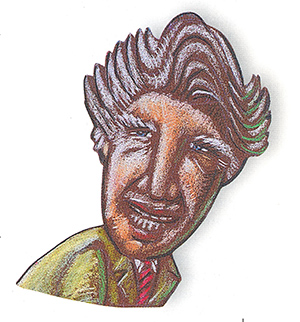 He was elfin and shock-haired, with a voice barely above a whisper. But he carried in him a rage against the epic lunacies and atrocities of the 20th century, with a poet’s way of expressing it. That was Professor Giovanni Costigan, professor of Irish history. As I recall, he was born in England, though he never carried any of the expatriate’s pretensions of Empire. He erred on the side of the underdog, of the person whose story seldom got a good telling, the asterisk in history.
He was elfin and shock-haired, with a voice barely above a whisper. But he carried in him a rage against the epic lunacies and atrocities of the 20th century, with a poet’s way of expressing it. That was Professor Giovanni Costigan, professor of Irish history. As I recall, he was born in England, though he never carried any of the expatriate’s pretensions of Empire. He erred on the side of the underdog, of the person whose story seldom got a good telling, the asterisk in history.
He rode a bicycle to campus most days, even as he aged well past mandatory retirement years. He walked with a stoop, and had a curled index finger which he raised to good effect. Like all who love the Irish, or have some of the Irish in them, he had a twinkle in his eye — the real thing.
Costigan was angry at the Vietnam War, and the lingering nuclear buildup of the Cold War. But his true passion was Ireland, and how the island had suffered such lasting torture at the hands of the English. He was never bitter. For he also loved Ireland for its better half-its poets, narrative voices, mythology and theater.
I am Irish-American, removed by three generations from the old sod. It was only through Dr. Costigan’s classes that I came to feel a larger sense of heritage. His classes were always packed, even on days when the Quad was lit with spring and promise. Afterwards, there was always a line of people waiting to talk with him. Class was never defined by the boundary of 50 minutes. He would read from Yeats-“Cast a cold eye on life, On death Horseman Pass by”-and then he would recount some obscure detail of the Famine, the Easter Rebellion, the Troubles. There are many tributes you can pay him. As a teacher, the best, perhaps, is this: When the bell rang, his class always ended too soon.
Timothy Egan is a reporter for the New York Times and author of two nonfiction books about western America, The Good Rain and the recently published Lasso the Wind: Away to the New West.
Charles Johnson
By John Keister
 Charles Johnson was a real writer. I had always wanted to meet one. I had always wanted to be one. His classes were everything I had hoped college would be. He worked us hard. We had big, challenging assignments every day. On Monday we would have to describe a single event through the eyes of five radically different people, Tuesday we’d have to write a thousand word sentence without using the word “and.” Crazy stuff, fun stuff, difficult stuff. I saved the assignment sheets and, to this day, hand out copies to people who ask how I became a writer.
Charles Johnson was a real writer. I had always wanted to meet one. I had always wanted to be one. His classes were everything I had hoped college would be. He worked us hard. We had big, challenging assignments every day. On Monday we would have to describe a single event through the eyes of five radically different people, Tuesday we’d have to write a thousand word sentence without using the word “and.” Crazy stuff, fun stuff, difficult stuff. I saved the assignment sheets and, to this day, hand out copies to people who ask how I became a writer.
Over the years I spent at the UW, Johnson’s classes took on a familiar pattern. The first week the class would meet in a regular classroom, where the 30 to 40 people would learn what the workload would be. Within a week we’d be down to five people and class would be held in the alternate little conference room that he kept reserved for the right time. Then the real class would begin. He had the mixture of humor and dedication necessary to deal with students like us: a collection of snotty, deadly serious little bastards who thought they were going to be the next Charles Bukowski or Kathy Acker. His direction was gentle but firm.
It turned out that I was better at writing disposable humor for television, the great Satan. But every now and then, I see Charles Johnson in a magazine getting a literary award or the critical praise that he richly deserves. I hold up the magazine and tell everybody within earshot that I used to study with this guy. It’s great to remember a time when I thought all things were possible and I was one of the good guys.
John Keister is the host and a writer for KING-TV’s comedy show Almost Live!, where his work has won 14 Northwest Emmy Awards. He previously edited the Daily and was a senior editor at the Rocket.
Hugh Bone
By John Carlson
 It was a blustery January morning, the first day of winter quarter during my freshman year at the University of Washington, and I arrived for class wondering if I even belonged at school. My first quarter had been so-so, and my heart was not in the work. To test my mettle, I had signed up for three upper-level classes, determined to either swim with the juniors and seniors or sink out of school.
It was a blustery January morning, the first day of winter quarter during my freshman year at the University of Washington, and I arrived for class wondering if I even belonged at school. My first quarter had been so-so, and my heart was not in the work. To test my mettle, I had signed up for three upper-level classes, determined to either swim with the juniors and seniors or sink out of school.
Into the classroom strode an amiable looking man in his late 60s, his thick white hair combed neatly back and neatly framed by steel-gray glasses, his face the picture of grandfatherly wisdom.
At the time, I thought of him as the teacher of Political Science 453. In time, I would learn firsthand that he was one of the finest professors and exemplars of the academic tradition to ever teach at the University.
His name was Hugh A. Bone. For 30 years, from the late ’40s through the late ’70s, he taught thousands of students about the political process, campaigns and state government. His mission, as he saw it, was to synthesize political theory and reality. He was in a perfect position to use his classroom lectures to inject students with political ideology, but he was not interested in changing the political views of students. He instead was intent on leavening youthful passions with depth, understanding and perspective.
You say you want to be a crusading environmental lawyer? Fine, but first, what is law? And what exactly is an environmentalist? You want to be an elected representative someday? OK. But how do you define representation?
Nobody knew for sure what Professor Bone’s politics were. In ’52 he attended both the Democratic and Republican conventions as a delegate. He probably was most compatible with Hubert Humphrey-Scoop Jackson Democrats or Dan Evans-Joel Pritchard Republicans. What came through in class discussions and his lectures was the importance of civility and mutual respect for your colleagues and adversaries in politics.
Before adjourning his class at the end of the quarter, Professor Bone would ask his students to please stay in touch. He recounted a letter he got in the mail from a student he hadn’t seen in 20 years. She wrote that she had never forgotten what she had learned in his classes and that she had just been elected to the Legislature from Montana.
“A letter like that makes my day,” Bone said.
This is the hallmark of a great teacher. He is happiest when honors come to his former students. Hugh Bone passed away knowing that his words, writings and examples helped many a young man and woman find the success that may have otherwise eluded them. I am glad I stayed in touch with him over the years. Thanks again, professor. -John Carlson, ’81
John Carlson is currently a talk-show host on the Internet broadcasting site TalkSpot.com. He was previously a newspaper columnist for the Seattle Times and Tacoma News Tribune and a talk-show host at KVI radio in Seattle. He co-founded the Washington Institute in 1985 and led three statewide initiative campaigns, including the “Three Strikes, You’re Out” and I-200 initiatives.
Markham Harris
By Ann Rule
 I chose creative writing as a major at the University of Washington by default; I entered the “U” as a “psych” major and washed out, as predicted, in statistics. I took creative writing because I enjoyed it, never thinking that I might one day have a career as a writer.
I chose creative writing as a major at the University of Washington by default; I entered the “U” as a “psych” major and washed out, as predicted, in statistics. I took creative writing because I enjoyed it, never thinking that I might one day have a career as a writer.
It was the Fifties, and Parrington Hall as an old building even then-smelling of dust, books, baking radiators in the winter, and of cherry blossoms in the spring. I remember how the stairs were worn down from would-be writers who climbed them decades before I did, and who must have had the same dreams. Parrington was always redolent of excitement and ambition.
We had professors who had already achieved glory: Archie Binns, Grant Redford, Theodore Roethke and Richard Eberhard-who taught us to love poetry in his modest way; most of us didn’t realize he was a major poet himself. He shared with us outrageously personal anecdotes about Dylan Thomas and Marianne Moore.
My favorite teacher, however, was Markham Harris, who taught short story and novel writing. He wore tweed jackets, smoked a fragrant pipe, had suitably shaggy eyebrows for a professor, and listened with genuine interest as 20 of us sat around a long, scarred oak table and took turns reading what we had created. He never criticized in a negative way, although some of our efforts might have warranted it. He discouraged such criticism from other students. He opened the doors of possibility wide to our nascent talent. He asked only that we write-which, after all, is the first step to glory-10,000 words a quarter (most of my 10,000 were written in crash creative orgies over the last weekend of the quarter). That was when I learned the true finality of a deadline.
A decade later when I ran into Mark Harris, I was married, with four little kids, and selling true-confession stories as fast as I could write them. I was almost ashamed to tell him what I was doing with my talent. I shouldn’t have been. Mark smiled and said, “I’m proud of you. You are actually making a living from writing, and you’re one of very few of my students to do that. I consider you one of my true successes!”
As I’ve moved on from true confessions-through fact-detective magazines-and, finally, to the New York Times best seller lists, I often think of Markham Harris. He not only taught us how to write, but he cheered us on all the way!
Ann Rule is the author of 15 books, including such bestsellers as The Stranger Beside Me, Bitter Harvest and Small Sacrifices. A Rage to Kill-an anthology of 10 criminal cases, all but one with a Washington state connection-will be published in July. In November her book on a murder involving staff in the Delaware governor’s office, …And Never Let Her Go, will be released.
Jack Brenner, Lois Hudson, Charles Johnson
By David Guterson
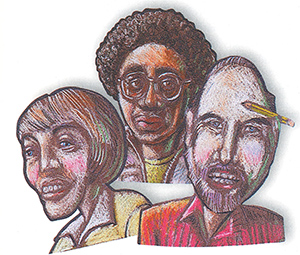 In the spring of 1977, I took a “Beginning Short Story Writing” class from Jack Brenner in the UW’s English department. Professor Brenner was soft-spoken, self-effacing, a thoughtful and honest man. Perhaps his finest trait as a teacher of writing was his ability to articulate the innate dignity of fiction, its grandeur of purpose and meaning. He also parsed fiction’s esoterica-point of view, landscape, symbolism, and so on-presenting each as a distinct and separate art to be cultivated systematically. The central notion of his class, it seemed to me, was that story writing was a worthwhile pursuit, fundamentally and intrinsically so, but only if the writer pursued it zealously, with real devotion to the details.
In the spring of 1977, I took a “Beginning Short Story Writing” class from Jack Brenner in the UW’s English department. Professor Brenner was soft-spoken, self-effacing, a thoughtful and honest man. Perhaps his finest trait as a teacher of writing was his ability to articulate the innate dignity of fiction, its grandeur of purpose and meaning. He also parsed fiction’s esoterica-point of view, landscape, symbolism, and so on-presenting each as a distinct and separate art to be cultivated systematically. The central notion of his class, it seemed to me, was that story writing was a worthwhile pursuit, fundamentally and intrinsically so, but only if the writer pursued it zealously, with real devotion to the details.
I also took courses in fiction writing from Professor Lois Hudson. Professor Hudson’s voice was mesmerizing-slightly nasal, suggestive of the plains, flat and poetic simultaneously. Her office in Padelford Hall had the feel of a second home somehow, a den stuffed with manuscripts, a haven and sanctuary. She would lean across her crowded desk, a sandwich in her hand, her eyes aflicker, and direct me in no uncertain terms to look in the stacks at Suzzallo Library for a particular story by Chekhov. I was grateful then-I remain grateful-for how closely and sincerely she read my work, and for the seriousness with which she approached my stories. Her gift as a teacher was a human gift, the ability to suggest to students that their talents were noted, appreciated. “You have the vision,” she sometimes said, as if vision-the writer’s vision-was a rare and mysterious quality. I, for one, believed her. She intimated that artistic fulfillment could be achieved through persistent, diligent effort.
Professor Charles Johnson, when I first knew him, was a hip young man in a black leather jacket who stood at the blackboard with a cigarette behind his back, ranting about Kant and Heidegger. You had to look and you had to listen-he was incapable of speaking in dull fashion. He was also a vast repository of knowledge and a writer who had studied with the legendary John Gardner-in short, Professor Johnson was charismatic, scholarly, and impressive. He brought to class a comprehensive metaphysic, a theory of the art of fiction, its meaning, purpose and value. He also brought an ambitious set of exercises, handed down from Gardner. Theory and craft went hand in hand. Neither had meaning without the other. Character, plot, symbolism, setting-they were all in the service of something larger. Yet fiction’s lofty aims could not be achieved without attention to the nuances of craft. Even the humblest of tools needed sharpening. The writer should neglect nothing.
Looking back, I am immensely grateful for these three mentors, each of whom took teaching seriously and seemed to understand how crucial it is, how much is at stake at every moment in the classroom. I carried them with me as I embarked on my own teaching career, and I carry them with me still, every day, as I work on stories and novels. I like to think of teachers as standing on one another’s shoulders from generation to generation, a great web knitting the world together. In this conceit, these three held their places well, did not neglect the past or the future, and strengthened the fabric of humanity. I remain grateful to them.
David Guterson’s newest novel, East of the Mountains, was released in April. His first novel, Snow Falling on Cedars, won the 1995 PEN/Faulkner Award for Fiction and spent more than a year on the New York Times best seller list. A film version will be released this December.
Siri Andrews
By Beverly Cleary
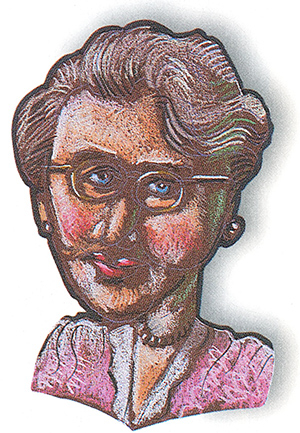 The UW School of Librarianship was 60 years ago! This was the darkest Depression, and I had come from the University of California and was existing in Seattle on $35 a month, $8 of which paid for my room a long walk from the campus. The remaining money went for meals in the Commons or in cheap restaurants nearby until my landlady, sensing my need, served a substantial breakfast for 20 cents.
The UW School of Librarianship was 60 years ago! This was the darkest Depression, and I had come from the University of California and was existing in Seattle on $35 a month, $8 of which paid for my room a long walk from the campus. The remaining money went for meals in the Commons or in cheap restaurants nearby until my landlady, sensing my need, served a substantial breakfast for 20 cents.
At the end of the first quarter, Dean Ruth Worden called me into her office to tell me I had done good work in her class in Book Selection but she was giving me a C because I had looked bored. I was stunned. I had found her course inspirational and could not believe any university would grade on the facial expression of any student, much less one who was exhausted and hungry. Dean Worden then offered me the use of the faculty restroom to dry my tears.
On the other hand, Professor Siri Andrews, who taught courses in children’s work, the reason I was attending the University, smiled but said nothing when I confessed my failure. She taught her classes in a brisk, businesslike way and must have had faith in me for she persuaded the Los Angeles Public Library to waive the residence requirement for me. However I could not afford the trip to Los Angeles to take the civil service examination. I became children’s librarian in Yakima, a position I enjoyed-and where I found inspiration for the books I was to write in the children who used the library. That is the way it was in those grim Depression days.
Beverly Cleary’s newest novel, Ramona’s World, will be released in August, the first new Ramona book in 15 years. Cleary’s books have won many awards, including a 1984 Newbery Medal for Dear Mr. Henshaw. Her work has appeared in more than 20 countries and 14 languages.
Tom Pressly
By Shelby Scates
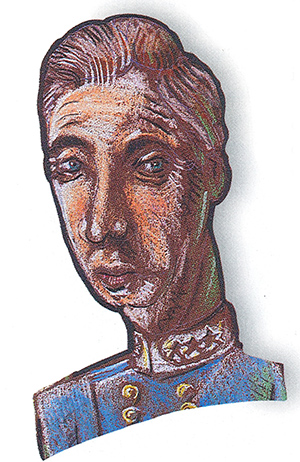 No Mr. Chips from my years as a University student, but great professors, specifically, Tom Pressly, Giovanni Costigan, Stull Holt, Angelo Pelligrini, Melvin Rader, George Taylor and Don Treadgold. They taught more than history and philosophy, although given their tutelage, these disciplines would have been sufficient to influence a young man’s life. Perhaps as important, they were exemplars of citizenship in a democracy, even without trying, advocates of respect for ideas, those of others as well as one’s own. The implied lesson: be wary of political absolutes from either the left or the right. It was a lesson learned.
No Mr. Chips from my years as a University student, but great professors, specifically, Tom Pressly, Giovanni Costigan, Stull Holt, Angelo Pelligrini, Melvin Rader, George Taylor and Don Treadgold. They taught more than history and philosophy, although given their tutelage, these disciplines would have been sufficient to influence a young man’s life. Perhaps as important, they were exemplars of citizenship in a democracy, even without trying, advocates of respect for ideas, those of others as well as one’s own. The implied lesson: be wary of political absolutes from either the left or the right. It was a lesson learned.
Tom Pressly, however, proved special. I came to the University as a son of the agrarian South and a grandson of the Confederacy. As such I wanted to know if there was a Yankee side to the story of our great 19th century conflict. Accordingly, I enrolled in Pressly’s American history survey course, where I learned there was, indeed, more to the war and to its result than Northern perfidy, Southern bad luck, and the monstrous ill will of Abraham Lincoln-the slant of my previous education at home and in the classroom.
At the end of the course, I approached Pressly to thank him for this enlightenment. He asked why and where I came from. I told him, “Union City, Tennessee, and that I never before heard the Yankee side of the Civil War.” Without any sign of irony, Pressly replied that he was from Troy, a hamlet between my home and the Mississippi River. Professor and student had grown up within seven miles of each other and emerged in another part of the continent and a vastly different culture. My hunch is that along the way from west Tennessee to Seattle, Tom Pressly had professors to teach him 19th century American history that were as great as he would become at the University of Washington. May the current generation be so well served.
Shelby Scates was a wire service reporter prior to his career as a reporter and columnist at the Seattle Post-Intelligencer. Now retired, Scates recently wrote Warren G. Magnuson and the Shaping of 20th Century America for UW Press. He is currently working on memoirs of his career in journalism, tentatively titled Wars-and Politics by Other Means.
Herbert J. Phillips
By Harvey Manning
 The professors were generally competent in presenting facts. A handful, in my case a half-dozen or so, demonstrated what to do with facts, how to think about them. I was lucky to study under skilled practitioners of several methods-the scientific, the poetic, the historical, the musical, the critical. They were the men and women who made the University more than a stack of books.
The professors were generally competent in presenting facts. A handful, in my case a half-dozen or so, demonstrated what to do with facts, how to think about them. I was lucky to study under skilled practitioners of several methods-the scientific, the poetic, the historical, the musical, the critical. They were the men and women who made the University more than a stack of books.
Professor Herbert Phillips began his opening lecture in Philosophy 1 by pointing to his shirt and asking what we noted. Silence. Broken by a brave stupid blurting, “It’s white.” I sneered, but Dr. Phillips nodded, held up a sheet of paper. “White.” What was the professor up to, that the stupid had got and I had not? A piece of blackboard chalk. A bright cloud out the window. The part of the eye you must see before you shoot. White, white, white — whiteness! I walked out on campus into grassness, under treeness, by squirrelness, studentness. Nessness! Thus I was introduced to thinking about thinking.
We went together on a five-day hike into wilds of the high Olympics. Climbing toward a summit, we were confronted by a jungle of slide alder, and before attempting it sat in the meadow. A cloud of mosquitoes descended. One settled on Dr. Phillips’ forearm, an easy target. Yet he did not kill, he watched, and so did I. I could not but empathize with her struggle through the tangle of hair, as daunting as the slide alder, to reach skin, and her frustration in sinking one dry hole after another, and then her triumph in hitting a gusher and filling her belly with red, red blood, which smeared the professor’s arm as he concluded the affair with a SPLAT.
Phillips was my only teacher who was fired for teaching.* I can’t recall the language used by President Raymond B. Allen in overruling the faculty panel of judges; the sense of the verdict echoed that against Socrates in 399 B.C.
In my post-University years, I’ve pretty well continued to obey my Boy Scout oath (“On my honor I will do my duty…”) and have done in (SPLAT) thousands of mosquitoes. Always with empathy, though. Evidence of how Dr. Phillips corrupted my young mind.
*Editor’s Note: Herbert Phillips was one of three tenured professors fired for being a Communist after the 1948 Canwell Committee hearings.
Harvey Manning is the author of Backpacking: One Step at a Time and co-author of more than 20 books about hiking in the Pacific Northwest, including the popular 100 Hikes and Footsore series. He was editor of the Washington Alumnus, the precursor to Columns, from 1962 to 1968.
Jon Bridgman
By Audrey Edwards
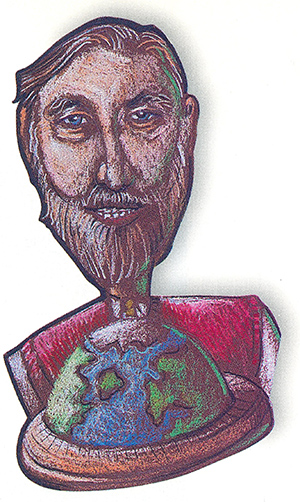 By the time I reached my junior year at the “U” and took my first class with Jon Bridgman in world history, I still had not chosen a major. I had heard that Bridgman was a good teacher, and history seemed as good a subject as any with which to fill out my class schedule. Bridgman taught the lecture session three days a week-one of those huge classes that had about 500 students sitting shoulder-to-shoulder in an auditorium. Though the class was large, impersonal and anonymous (or so I thought), his infectious enthusiasm kept everyone awake and riveted.
By the time I reached my junior year at the “U” and took my first class with Jon Bridgman in world history, I still had not chosen a major. I had heard that Bridgman was a good teacher, and history seemed as good a subject as any with which to fill out my class schedule. Bridgman taught the lecture session three days a week-one of those huge classes that had about 500 students sitting shoulder-to-shoulder in an auditorium. Though the class was large, impersonal and anonymous (or so I thought), his infectious enthusiasm kept everyone awake and riveted.
Combining scholarship with passion, humor and a flamboyant sense of the theatrical, Bridgman made history come alive for me in ways matched only years later by those wonderful PBS specials, Eyes on the Prize and The Civil War. Who knew that history could be so exciting? I was hooked, and ended up choosing it as a major. Many years later as a journalist, I could finally answer the question parents and friends always put to me after my junior year: “But what will you do with a history major? Teach?” Not exactly. Through history, Bridgman taught me how to see and understand cause and effect; to take the larger view; see both sides of an issue; and put events and people in context as well as perspective. In short, I learned how to think critically and analytically, and that has always informed my reporting and writing as a journalist.
What I also learned in that first class with Bridgman was just how un-anonymous I was as an African-American. I was one of about 100 at the UW during that time. I once missed a class, and when I showed up for the next session, Bridgman casually said to me after class as I was trooping out with the masses, “We missed you on Monday.” I was both flattered and horrified. Flattered that he noted I was absent-and horrified that he noted I was absent. I knew then, not much got past this guy. I never missed his class again.
Audrey Edwards is a senior editor at MORE magazine and a contributing writer at Essence. Edwards is also a member of the Columns Advisory Committee. She is the co-author of Children of the Dream: The Psychology of Black Success .